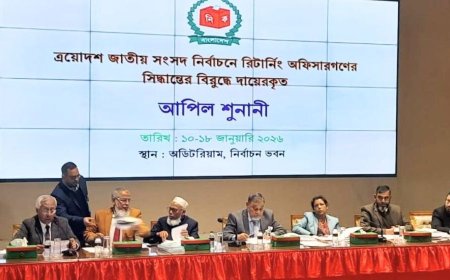BNP expresses conditional support for limiting Prime Minister's tenure
BNP expresses conditional support for limiting Prime Minister's tenure

BNP Backs PM Term Limit with Conditions, Opposes Appointments Proposal
The Bangladesh Nationalist Party (BNP) on Wednesday conditionally endorsed a proposal to cap a person’s tenure as Prime Minister at 10 years over their lifetime, but voiced strong reservations about the accompanying proposal for a constitutional appointments committee.
“We support the idea that no one should serve as Prime Minister for more than 10 years in their lifetime,” said BNP representative Salahuddin Ahmed, speaking to reporters after the sixth day of the second round of talks hosted by the National Consensus Commission (NCC) at the Foreign Service Academy in Dhaka. “However, we cannot support this if it leads to undue interference by bodies such as the National Constitutional Council or a new appointments committee in the functioning of the executive.”
Ali Riaz, Vice Chairman of the Consensus Commission, confirmed that the Prime Minister’s term limit was discussed again during Wednesday’s session but said no agreement had been reached. “A final decision on this issue is unlikely until the parties come to a consensus on the proposed appointments committee for constitutional and statutory bodies,” he noted during an afternoon press briefing.
Jamaat, Others Support Term Limit
In contrast to BNP’s stance, Jamaat-e-Islami’s Nayeb-e-Ameer Syed Abdullah Muhammad Taher expressed full support for the 10-year term limit, telling reporters during the lunch break, “No person should serve as Prime Minister beyond a total of 10 years in their lifetime.”
Revised Proposal on Appointments Body
The Commission also tabled a revised proposal concerning the authority responsible for appointing key figures in constitutional and statutory institutions. The new plan replaces the previously suggested “National Constitutional Council” with a proposed “Appointment Committee for Constitutional and Statutory Institutions.”
Unlike the earlier version, this revised committee would exclude the President and Chief Justice. Instead, it would consist of seven members: the Prime Minister, Leader of the Opposition, Speakers of both Houses of Parliament, a presidential nominee, a justice nominated by the Chief Justice, and a representative from other opposition parties excluding the main opposition. The Lower House Speaker would chair the meetings.
Prof. Ali Riaz stated that the new proposal reflects changes in three key areas: name, membership, and scope of authority. “Most political parties welcomed these revisions, although some raised objections. The Commission has received recommendations from supporting parties and will present a consolidated proposal next week.”
BNP Seeks Legal Reforms Instead
Commenting on the revised structure, Salahuddin reiterated BNP’s opposition, saying, “We want reforms through legislative changes to existing appointment laws rather than the creation of a new overarching authority. These laws must include search committee mechanisms to avoid executive overreach.”
He also called for legal provisions to ensure institutional transparency and accountability. “Where laws don’t exist, new legislation must be introduced. Where laws already exist, they should be amended to guarantee a system of checks and balances.”
Jamaat Backs Revised Proposal; BNP Stands Alone
Jamaat’s Syed Abdullah Muhammad Taher said all parties except BNP backed the revised appointments body. “Only one party—BNP—opposed the revised structure,” he confirmed in response to a media query.
AB Party Chairman Mujibur Rahman Manju expressed disappointment over the lack of full consensus. “If this proposal is ultimately rejected, we won’t achieve anything substantial,” he warned.
Background: The Original NCC Proposal
The initial NCC proposal featured a nine-member council, including the President, Prime Minister, Chief Justice, Leader of the Opposition, Speakers and Deputy Speakers of both Houses, and one representative from minor opposition parties. The body was tasked with appointing key figures such as the Chief Election Commissioner, Election Commissioners, Attorney General, PSC and ACC members, Human Rights Commission members, heads of armed forces, and others as defined by constitutional law.
BNP’s concerns over accountability led the Commission to revise the original plan.
Debate over Fundamental Principles
The Commission also proposed amendments to the fundamental principles of the Constitution. The original principles—equality, human dignity, social justice, and democracy—have now been expanded to include religious freedom, harmony, and impartiality.
While no consensus has yet been reached, Ali Riaz said most parties have supported the inclusion of the five elements, and a refined proposal will be presented next week.
BNP's Salahuddin, however, argued for the restoration of key provisions from the Fifth Amendment and suggested integrating the language proposed by the Reform Commission into the new formulation.
What's Your Reaction?






















































































